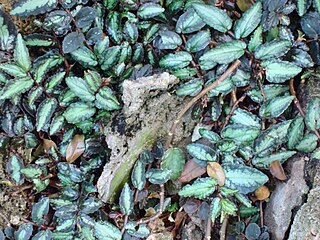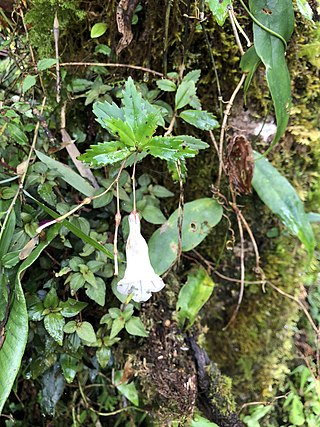
Anemone is a genus of flowering plants in the buttercup family Ranunculaceae. Plants of the genus are commonly called windflowers. They are native to the temperate and subtropical regions of all regions except Australia, New Zealand, and Antarctica. The genus is closely related to several other genera including Anemonoides, Anemonastrum, Hepatica, and Pulsatilla. Some botanists include these genera within Anemone.

Dracocephalum is a genus of flowering plants in the family Lamiaceae, native to temperate regions of the Northern Hemisphere. These flowers, collectively called dragonhead, are annual or perennial herbaceous plants or subshrubs, growing to 15 to 90 centimeters tall. The genus has 89 species as currently circumscribed, which includes the formerly separate genera Hyssopus, Lallemantia, and others. Older circumscriptions include 60 to 70 species.

Ampelopsis, commonly known as peppervine or porcelainberry, is a genus of climbing shrubs, in the grape family Vitaceae. The name is derived from the Ancient Greek: ἅμπελος (ampelos), which means "vine". The genus was named in 1803. It is disjunctly distributed in eastern Asia and eastern North America extending to Mexico. Ampelopsis is primarily found in mountainous regions in temperate zones with some species in montane forests at mid-altitudes in subtropical to tropical regions. Ampelopsis glandulosa is a popular garden plant and an invasive weed.

Aeschynanthus is a genus of about 150 species of evergreen subtropical and tropical plants in the family Gesneriaceae. They are usually trailing epiphytes with brightly colored flowers that are pollinated by sunbirds. The genus name comes from a contraction of aischuno and anthos (flower). The common name for some species is lipstick plant, which comes from the appearance of the developing buds emerging from the calyces. A full list of the accepted species and their synonyms can be found in the Smithsonian Institution's World Checklist of Gesneriaceae.

Vitis (grapevine) is a genus of 81 accepted species of vining plants in the flowering plant family Vitaceae. The genus consists of species predominantly from the Northern Hemisphere. It is economically important as the source of grapes, both for direct consumption of the fruit and for fermentation to produce wine. The study and cultivation of grapevines is called viticulture.

Phaeanthus is a genus of plants in family Annonaceae native to Indo-China, Malesia and the island of New Guinea.

Pellionia is a genus of flowering plants in the family Urticaceae. The flowers of Pellionia are white globules held on stalks above the plant, which respond to changes in temperature by releasing their pollen as little puffs of smoke.

Eritrichium is a genus of flowering plants in the family Boraginaceae. It contains 78 species. Notable members include Eritrichium howardii and Eritrichium nanum.

Lysionotus is a genus of flowering plants in the family Gesneriaceae. It occurs in the Himalayas, China, Japan, and Southeast Asia. The genus was described by David Don in 1822.

Anemonastrum is a genus of flowering plants in the family Ranunculaceae. Plants of the genus are native to the temperate and subarctic regions of North America, Greenland, Europe, Asia, South America, and New Zealand. The generic name Anemonastrum means "somewhat like anemone", a reference to the Anemone genus of closely related plants. It chiefly differs from Anemone in having a base chromosome number of x=7, as opposed to x=8.

Trigonotis is a genus of flowering plants belonging to the family Boraginaceae. It includes 70 species which range from southern European Russia to Asia and New Guinea.
Allocheilos is a genus of flowering plants belonging to the family Gesneriaceae.
Gyrogyne is a genus of flowering plants belonging to the family Gesneriaceae.
Gyrocheilos is a genus of flowering plants belonging to the family Gesneriaceae.
Didymostigma is a genus of flowering plants belonging to the family Gesneriaceae. It includes two species native to southeastern China and Hainan.

Metapetrocosmea is a genus of flowering plants belonging to the family Gesneriaceae. It includes ten species native to southern China, Hainan, and Vietnam.

Dichocarpum is a genus of flowering plants belonging to the family Ranunculaceae.
Microula is a genus of flowering plants belonging to the family Boraginaceae.
Omphalotrigonotis is a genus of flowering plants belonging to the family Boraginaceae.
Bournea is a genus of flowering plants in the family Gesneriaceae. It includes two species native to southeastern China.












